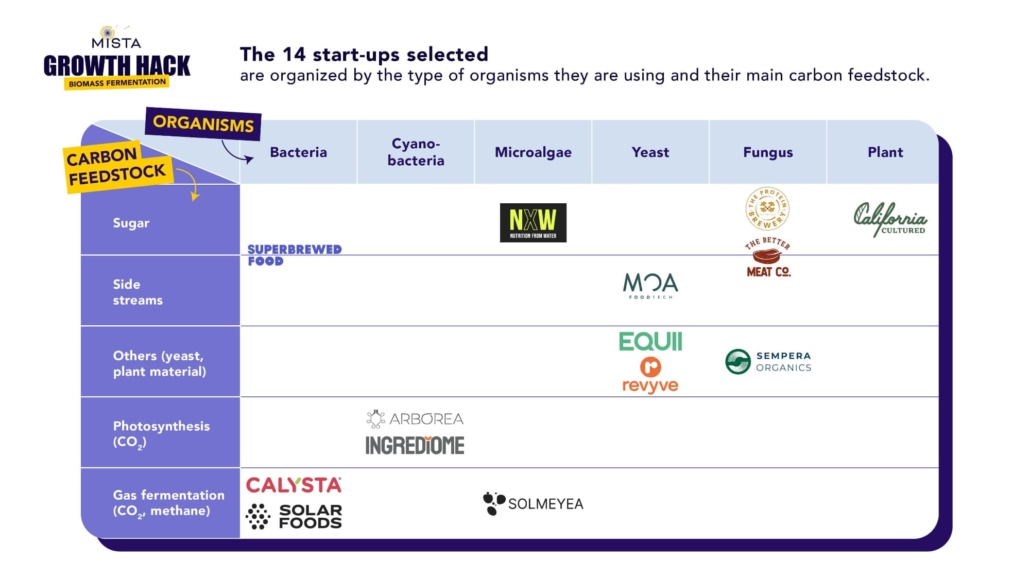MISTA Growth Hack 2024 focuses on biomass fermentation
The second annual MISTA Growth Hack brings together food-tech start-ups and global food companies to focus on innovating biomass fermentation, with the aim of addressing future nutritional and sustainability challenges.
MISTA, the Givaudan-owned food innovation platform, has announced biomass fermentation as the central theme for its 2024 Growth Hack. This collaborative event will unite 14 food-tech start-ups with eight leading global food companies to develop integrated solutions for more nutritious, affordable, and sustainable foods.
Programme structure
The hands-on programme is designed to foster innovation across the corporate global food system. Accenture, the Good Food Institute (GFI), and SOSV are presenting partners for the 2024 event.
Céline Schiff-Deb, Chief Science Officer for MISTA, explained the choice of focus: “The food system needs new solutions to feed the 8.5 billion people that will populate the Earth in 2030. Fermentation biomass is an approach that grows microbial cells (think microalgae, fungi, yeast or bacteria) that are packed with healthy nutrients, including proteins, fibres, vitamins and minerals.”
Schiff-Deb highlighted the potential of this technology: “By leveraging this millennia-old technology, we can produce vast amounts of nutritious, affordable and sustainable ingredients that can improve the nutritional and sensory performance of foods, beverages and snacks.”
Participating start-ups
The 2024 cohort comprises 14 start-ups from around the world, each selected for their unique technologies leveraging various organisms, approaches, and carbon feedstocks. The participants include:
- Arborea
- California Cultured
- Calysta
- EQUII
- Ingrediome
- MOA Foodtech
- Nutrition From Water
- Revyve
- Sempera Organics
- Solar Foods
- Solmeyea
- Superbrewed Foods
- The Better Meat Company
- The Protein Brewery.
Technical teams and prototype development
Each start-up will lead a technical team tasked with developing a food or beverage prototype that showcases their hero ingredients. These teams will include experts from MISTA’s corporate members, including AAK, Buhler, CJ CheilJedang, Danone, Givaudan, Ingredion, JPG Resources, and SIG.
Scott May, Founder and Head of MISTA, emphasised the collaborative nature of the event: “MISTA’s cross-value chain ecosystem is curated to connect innovators and opportunities, delivering new potential to evolve people, teams and companies. The MISTA Growth Hack demonstrates how we collaborate to bring the largest players in the food system together with an amazing array of early-stage companies, bringing new ingredients and technologies to life.”
Event timeline
The teams will meet virtually over the coming months to refine their ideas and approaches. In early November, they will convene physically at either the MISTA Innovation Centre in San Francisco or Givaudan’s Zurich Innovation Centre in Kemptthal, Switzerland, to finalise their projects.
The culmination of this collaborative effort will be a two-day event in San Francisco on 19 and 20 November 2024. The first day will feature a technical symposium bringing together global experts to discuss opportunities for accelerating the adoption of food products derived from biomass fermentation.
On the second day, each of the 14 discovery teams will present their findings, highlighting the unique technologies of the individual start-ups. Attendees will then have the opportunity to sample the culinary output of each team.
Implications for food science
This initiative represents a significant step in the field of food science, particularly in the area of alternative protein sources and sustainable food production. By focusing on biomass fermentation, MISTA and its partners are exploring a promising avenue for addressing global nutritional needs while potentially reducing the environmental impact of food production.
The collaboration between established food companies and innovative start-ups is likely to accelerate the development and commercialisation of new fermentation-based food technologies. Food scientists should pay close attention to the outcomes of this event, as it may yield insights into novel ingredients, processing techniques, and product formulations that could shape the future of the food industry.
- For more information, visit: www.mistafood.com.



